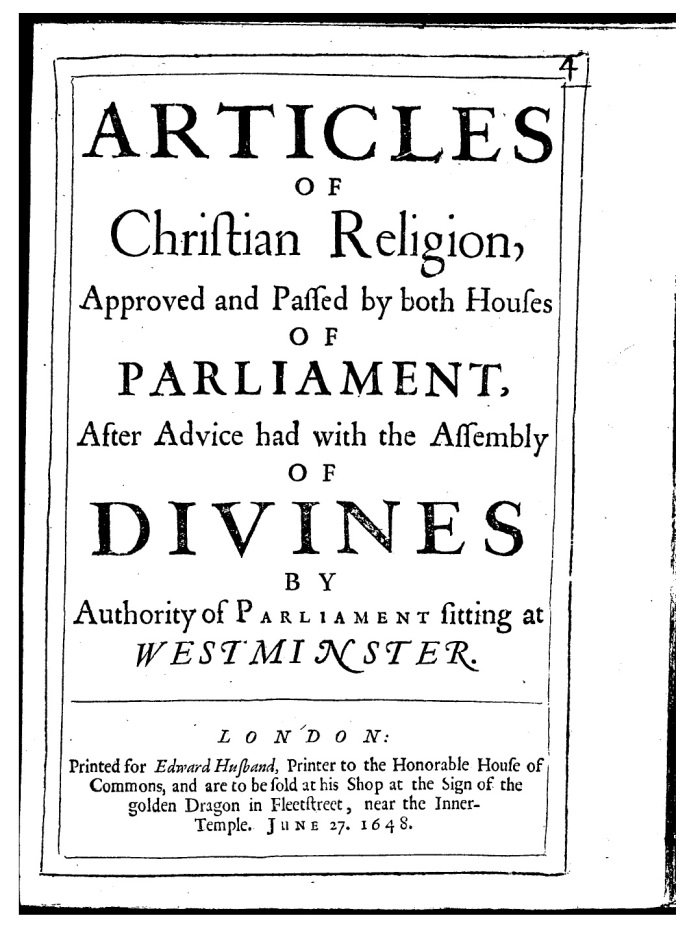Click to enlarge.
Westminster Shorter Catechism 1-3

“Thus is my deliverance.”
These thoughts are directed primarily at members in the OPC and PCA.
For those contra republication:
For those pro republication:
For both groups:

A careful examination and comparison of the Second London Baptist Confession (LCF) and the Westminster Confession (WCF) yields a variety of differences and nuances, some more obvious than others. One such difference is found in the second chapter, “Of God and of the Holy Trinity.” The London Confession is considerably more detailed and technical in its formulation of the doctrine of God (which is not to imply any lack of orthodoxy on the part of the WCF). This technicality is seen in the LCF’s use of “subsistence” instead of “person.” Compare the following:
WCF 2.3

LCF 2.3

Why the change? Or what’s the difference between Person and Subsistence? The short answer is that while there is no doctrinal difference, the term “subsistence” is more technical and carries less linguistic baggage. John Owen shows the agreement of the two terms:

Richard Muller provides the following definition for “subsistentia”: An individual instance of a given essence. [Subsistence has other meanings as well, in fact it is used in a different way in paragraph one to describe God’s self-existence. His “subsistence is in and of himself” meaning that he derives his existence from himself. Or in another sense, his existence is not derived at all.]
Think about that for a moment. There is only one divine essence. Thus, three divine subsistences must all share one divine essence. How can one essence be distinguished into three subsistences but not divided? It is infinite. The essence of God is deity. The essence of man is humanity. Human nature is finite, thus no one else can subsist within my essence. I may share a common essence with humanity, but it is a divided, individual, and separated essence. A substance is an essence in existence, thus each human being is a different and separate substance sharing the common essence of humanity. But there is one divine essence and thus one divine substance, in which godhead the three persons of the trinity subsist.
This makes “subsistence” the perfect word for expressing the technical unity and trinity of God because it necessarily connects to a given essence, in this case the singular and unique essence of deity. “Person” carries with it the linguistic baggage of human personhood connected to human essence. Without proper definition, “person” can be easily misused. Trinitarian personhood is not human personhood. That being said, the WCF is in no way heterodox on the trinity. The term “person” is perfectly capable of carrying these theological distinctions. One must simply be careful. Consider the discussion of this anonymous writer. He begins by saying that the doctrine of the Trinity is practical to us because it helps us to know the one God that we love, worship, and serve.

Next he warns us of the need for precision because the Socinians (in their Racovian Catechism, see end of post) claimed that God was one person. Their fundamental flaw was to equate human personhood with divine personhood.

Persons are distinguished by personal relations and peculiar relative properties, as the LCF above made clear. Notice how in the midst of this he reminds the reader that “the divine nature is unchangeable and indivisible, and not multiplicable; therefore there is no proper action nor passion, as in nature, nor production of new being.” In other words, the eternal generation of the Son never “happened” because God is not bound by time, thus nothing can “happen” to him, i.e. no passion. He is pure being, no becoming. Thus the Son’s generation is eternal in the sense that it is atemporal. Were God bound by time, he would be changeable. Were the Son brought forth from the Father as we conceive of generation, then the nature of God would be both divisible, multiplicable, active, and passive in time (which it is not – he has no parts or passions).

Next he explains where we get the term “person” from and why we use it, acknowledging that there may be better ways to express the concepts. Once again he reminds the reader to separate ideas of human personhood from divine personhood. God is altogether other than we are.

The language we use is “improper,” that is, it does not fully describe, though it does truthfully describe, who and what God is.

In light of all of these careful nuances and important distinctions, we can safely conclude that while there is no doctrinal disagreement or difference between the two confessions, the LCF displays a careful desire for further technicality and precision and thus employs the term “subsistence” rather than person.
***A judicious and impartial reader pointed out to me that 2LCF 8.2 employs “person” while referring to Christ as the “Second Person” of the Holy Trinity. This is corroborative evidence of the fact that “subsistence” is a technical, not a doctrinal choice of language.***
See also:
John Norton on Passivity and Suffering
John Norton on the Divine Names and Perfections of God
In the previous two posts, we have looked at the distinction between form and matter. The first post dealt with this distinction in relation to the republication of the law of the covenant of works in the Mosaic covenant. The second post dealt with this distinction more broadly, and showed the direction that the Particular Baptists would take this distinction in order to say that though the promise of the new covenant (the gospel) was made known in all of redemptive history, it was not formally established as a covenant until Christ’s death.
To refresh, in light of the formal/material distinction, just because the law is present in a given covenant, it does not mean that this covenant is the covenant of works. Conversely, just because the promise (the gospel) is present in a given covenant, it does not mean that this covenant is the covenant of grace.
In this post, I want to continue along similar lines in order to show the differences between Particular Baptist federal theology and that of their Paedobaptist brothers. I want to do this by showing how the same argumentation was employed, only with completely opposite arguments.
Let’s begin with the Paedobaptists.
Peter Bulkley argues that although the law of the covenant of works was revealed to Israel in the Mosaic covenant, the Mosaic covenant was not a covenant of works. Why? Because the Mosaic covenant was established on different terms and conditions than the covenant of works. For Bulkley, the Mosaic covenant was an administration of the covenant of grace. In fact, it was the covenant of grace.

Notice the argumentation: the law of the covenant of works, i.e. its material basis, was revealed to Israel, but it was not the basis for their covenant.
William Bridge makes the same argument. He begins with the same foundation of the substance/administration distinction. The Mosaic covenant is the covenant of grace.


In the Mosaic covenant, the covenant of works is declared, but the covenant of grace is actually made.
The Particular Baptists employed the same argumentation with opposite arguments. They argued that the promises of the new covenant were revealed and made known from Genesis 3:15 onward, but they were not the material basis for a formal covenant until Christ spilled his blood. The new covenant was truly new. No covenant leading up to it had been established on the promise of eternal forgiveness of sins. All of the covenants of the Old Testament contributed to the progressive revelation of the new covenant, but they were not the new covenant in and of themselves. The new covenant was established on better promises, which meant that it was established on different promises which meant that it was a different covenant.
Nehemiah Coxe gives us an example of the covenant of grace being revealed without being formally made or transacted.

Christopher Blackwood argues that the new covenant is promised but not covenanted in Genesis 17.

Isaac Backus makes the same argument.

This argumentation has been called “promise and promulgation.” The new covenant is promised, but not promulgated in the Old Testament. It exists in its promises alone. This aligns perfectly with the formal/material distinction because both sides will agree that the material basis of another covenant can be revealed and made known independently in a given covenant without becoming a formal covenant. In other words, the law can play a role in the covenant of grace without turning it into a covenant of works for believers. Likewise, the gospel can play a role in the old covenant without turning them into the covenant of grace.
An anonymous Particular Baptist focuses on the betterness of the new covenant’s promises.

Samuel Fisher highlights the meliority “betterness” of the new covenant’s promises.


These excerpts help to highlight the similarity in argumentation alongside of the dissimilarity in arguments between the Particular Baptists and their Paedobaptist brothers. Both sides argued that the law and gospel run through all of the covenants of the Old Testament.
The Paedobaptists were happy to argue that the law was revealed and made known in certain covenants without those covenants being covenants of works. The Old Testament covenants played roles within the two administrations of the covenant of grace.
The Particular Baptists argued that the old covenant was a covenant of works for life in Canaan. It was a covenant that perfected no one’s conscience because it forgave no one’s sins. The new covenant, revealed from Genesis 3:15 onward, was the covenant of grace formally established on the material basis of the promise of forgiveness of sins in Christ’s blood. It was established on different promises, better promises, everlasting promises.
To add a little more to the previous post on formal and material republication, let me fill out how the distinction between form and matter works on a larger scale.
When it comes to justification, the material basis of a covenant is either law or promise. Works/law and grace/promise do not intermingle.
If two parties are committed to each other based on a law, a covenant of works has been established. If two parties are committed to each other based on a promise, a covenant of grace has been established. The matter dictates the form.
In light of this distinction, just because the law is present in a given covenant, it does not mean that this covenant is the covenant of works. Conversely, just because the promise (the gospel) is present in a given covenant, it does not mean that this covenant is the covenant of grace.
James Durham demonstrates the difference between a law, and a law used to established a covenant of works.
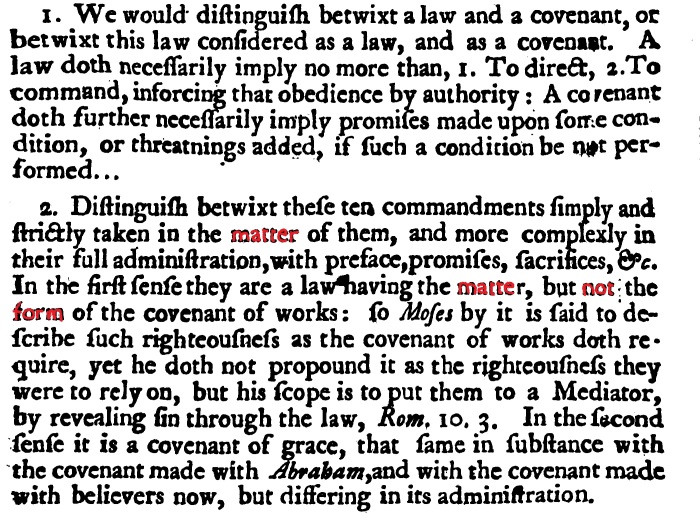
In this line of thinking, Obadiah Sedgwick argues that although the law was present in the Mosaic covenant, it was not a formal covenant of works. This is material republication (as was Durham above).

This also applies to believers. In the Marrow of Modern Divinity, Edward Fisher wanted to protect the idea that although the law came to believers, it did not come as a covenant of works. Legalism is inevitable if we are convinced that the law necessarily entails a covenant of works.

Now, how did this play out in Particular Baptist theology? John Owen will be our theologian. Nehemiah Coxe considered Owen’s work on Hebrews to be representative of his own views on covenant theology.
First, Owen is operating within the same ideas and makes the same points made above, that we have to distinguish between the law on its own and the law as a covenant.

The same is true for the promise of the gospel. Just because the promise of the gospel is present from Genesis 3:15 onward, it does not follow that the covenants wherein it appears are the covenant of grace. Owen argues that the covenant of grace was only a promise until its formal establishment in the new covenant. The elect were saved by virtue of the covenant of grace (the promise of the gospel) in all the ages, but it was not formally established until Christ’s death.

The same point is made again, showing how the New Covenant could not be new if it had already been formally established.
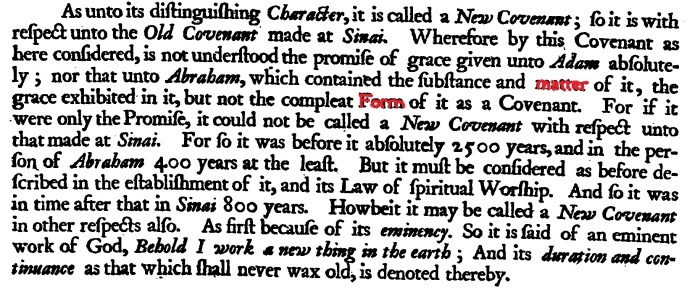
The law and the gospel (the promise) are present in the Abrahamic, Mosaic, Davidic, and new covenants.
Westminster paedobaptists will argue that all of these covenants were established on the promise of the gospel and thus were covenants of grace, or rather a twofold administration of the covenant of grace. The law played the same role in all of them, namely as a rule of righteousness (more burdensome in the OT). None of those covenants were covenants of works.
Particular Baptists will argue that although the promise of the gospel was present and revealed in all of the OT covenants, they were not the covenant of grace. The old covenant saved no one because it was a covenant of works for life in Canaan. Until the New Covenant was formally established in Christ’s blood, the covenant of grace existed in promise form only. The new covenant is truly new, the fulfillment of everything promised and hoped for in redemptive history. No covenant was formally established on the promise “I will remember your sins no more” until the blood of Christ inaugurated the new covenant.
In debates concerning the republication of the covenant of works within the Mosaic covenant, anyone who holds to the Westminster Confession or the London Baptist Confession confesses that the same law that was given to Adam was delivered to Moses. At the very least, then, the confessions teach a republication of the law of the covenant of works. Where things get more complicated is when we discuss how that law functioned. Was the law given to Moses as a covenant of works? That is a much larger statement than simply that the same law given to Adam was given to Moses.
To help understand how this issue works, we need to understand how the distinction between form and matter was applied to covenant theology. The formal nature of a covenant depended on its material basis. Think of matter and form. If you make something from clay (a kind of matter), then you will get a clay object (a form). Likewise for wood or stone. Different materials produce different forms. A union of form and matter is a substance. In covenant theology, if a covenant was established on the basis of law, the covenant was a covenant of works. If a covenant was established on promise, the covenant was a covenant of grace. The covenant partner would respond accordingly, with obedience to the law and reception/belief of the promise. Nehemiah Coxe shows this difference.
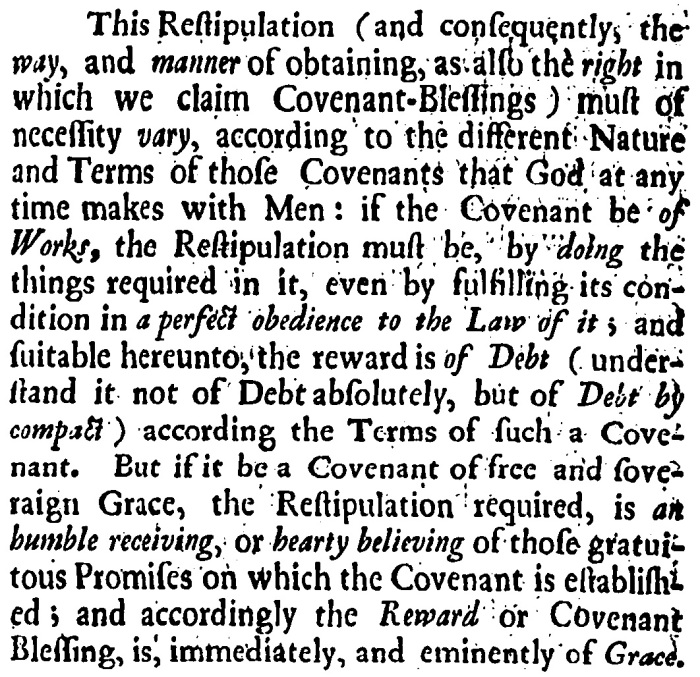
Law and promise are contradistinguished matters that produce contradistinguished forms. Because a union of form and matter is a substance, covenants that differ in substance are covenants that differ in form and matter. This is a complicated way of saying that a covenant of works and a covenant of grace are two different things. A covenant of works is built on law. A covenant of grace is built on promises. They differ in matter, form, and thus substance. Any formal covenant of works cannot be a covenant of grace.
In light of this, some have spoken of material republication and formal republication. Material republication indicates that the matter of the covenant of works, i.e. the law, was delivered to Moses. Both confessions confess this. Formal republication indicates that not only was the matter of the covenant of works delivered to Moses, but it was also the basis upon which Moses’ covenant was established. Thus the law was materially and formally republished, meaning that the Mosaic covenant was a covenant of works.
With all of this in mind, there is a significant difference between the Westminster Confession and its sister documents, the Savoy Declaration and the London Baptist Confession.
Notice the red text above: “as such.” This limits the nature of the function of the law as it was given to Moses. It was given to Moses “as a rule of righteousness“. Formal republication is of course built on material republication. But material republication, i.e. the presence of the law in the Mosaic covenant, does not necessarily entail formal republication. Just because the law is there, it doesn’t mean that the law is functioning as a covenant of works. The Westminster Confession does not go beyond material republication to formal republication. In fact, this clause “as such” specifically limits the role of the law delivered to Moses to a “rule of righteousness.” This is very consistent with the view that the Mosaic covenant is a covenant of grace (as WCF confesses). God redeemed Israel and gave them the law as the path for their grateful obedience.
The Savoy Divines and the Particular Baptists did not agree. Both confessions delete the phrase “as such.”
Why would they make such a deletion? Well, speaking only for the Particular Baptists, there are two fundamental reasons:
1. They believed that the old and new covenants differed in substance, not just administration. In other words, the old covenant is something other than the covenant of grace. Why did they believe that? They believed that the old covenant differed in substance because it was a covenant of works, contradistinguished from the covenant of grace. The covenant of works and the covenant of grace were materially and formally distinct, and thus substantially distinct. Andrew Ritor makes this point:
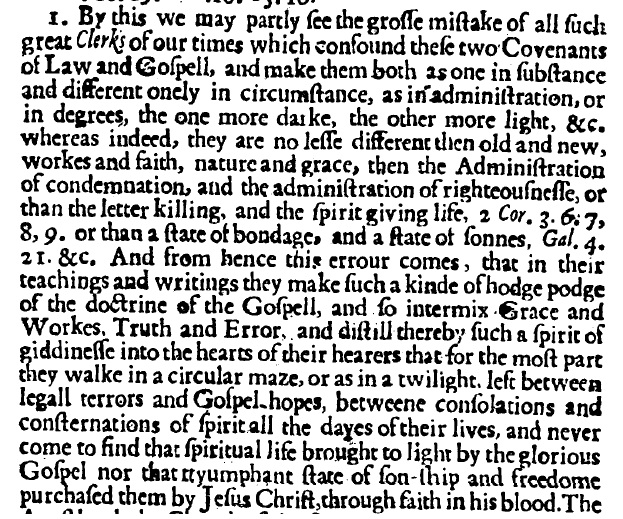
2. We already mentioned the second reason for the change in the confession, namely that the Particular Baptists believed that the law was delivered to Moses, not just as a material republication of the universal moral law of righteousness to which all men are obligated, but also as a the basis for a formal covenant of works. Clarification needs to be added here that different Particular Baptists took this in somewhat different directions. Some confined the Mosaic covenant of works to temporal life in Canaan, meaning that the Mosaic Covenant did not offer eternal life. Others, however, spoke of the Mosaic covenant as being the original covenant of works itself delivered to Israel.
Coxe is another helpful example of the former direction:
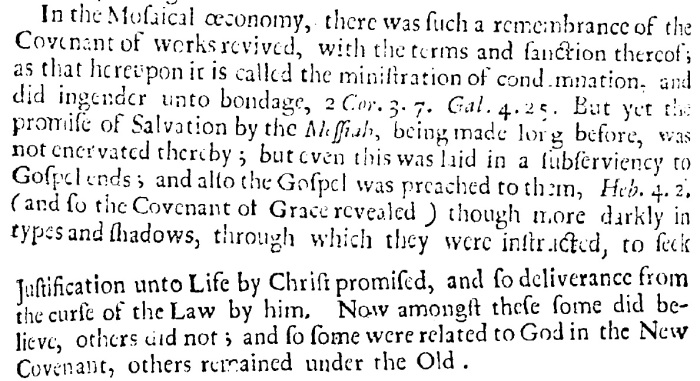
In conclusion, I want to make a few brief points.
1. Regarding the London Baptist Confession, the deletion of the phrase “as such” is not so much a positive affirmation of formal republication as it is an opening of the door wide open for it. Chapter 19 is not about the Mosaic covenant; it’s about the law. So the London Baptist Confession’s removal of the phrase “as such” is simply a refusal to restrict the giving of the law to Moses to a rule of righteousness.
2. Conversely, the WCF does not allow for formal republication. Why did so many Westminster Divines hold views beyond material republication, then? We have to remember the context of the Westminster Confession. It was a government-ordered project. It was designed to be a public standard of preaching and teaching, not to be contradicted. It was not designed for some of the subscriptional standards used by Presbyterian denominations today. To argue that since certain divines held to formal republication (or other variants thereof), the confession must allow for those views, is anachronistic. They held contradictory views, but were not to publicly contradict the confession. In an age of ever-shifting government and an ever-shifting state church, one must be careful to take the context into account. In England, the WCF as we know it did not have the impact that it had in Scotland because its final approved form had to please an Independent-controlled Parliament. The answer to the diversity of the views of the divines is not necessarily that “they must all fit within the confession because it was a consensus document.” This is especially true when many Westminster divines would gladly use the magistrate to punish those whom they deemed heretics (as they did). The London Baptist confession assigns the promotion of peace and justice as well as lawful war-waging to the civil magistrate. But the Westminster Confession assigned further powers of suppressing blasphemies, heresies, and reforming the worship of the church. Keep that in mind.
See also:
https://pettyfrance.wordpress.com/2013/03/14/confessional-subscription-and-the-westminster-assembly/
https://pettyfrance.wordpress.com/2013/06/20/the-textual-history-of-the-westminster-confession-of-faith/
3. Behind all of this is the Subservient Covenant, from John Cameron to Samuel Bolton to John Owen to the Particular Baptists. But that’s another story (and perhaps a dissertation…).
More on this here: http://contrast2.wordpress.com/2010/09/05/wcfsdflbc-19-12-and-republication/
Recently I have been reading this excellent work by Andrew Woolsey. In one section on the primary sources behind the Westminster Confession of Faith, Woolsey shows the strong influence of John Ball on the confession in general and chapter seven in particular. What I want to point out is the concept of covenantal merit at play in paragraph one of the Westminster Confession and the London Baptist Confession. The two confessions are very similar here.
The Westminster Confession speaks broadly by saying that God’s creatures, though they be obligated to obey God as creatures unto their Creator, could expect no reward whatsoever for their obedience. Yet because God voluntarily condescended to make promises to men, he did so by way of covenant. The London Confession follows the Savoy Declaration by narrowing the focus to the reward of life in particular. But the same principle is operative in both, the principle of covenantal merit. In other words, man’s natural obedience due to God according to the law of nature in no way obligated God to give anything to man. Man’s natural obedience was not intrinsically meritorious. The texts cited in support of this are significant.
Luke 17:10 “So you also, when you have done all that you were commanded, say, ‘We are unworthy servants; we have only done what was our duty.'”
Job 35:7 “If you are righteous, what do you give to him? Or what does he receive from your hand?”
You can’t give anything to the Creator that does not already belong to him, thus he has no obligation to give anything back to you. But when he does, it is a condescension, and God’s condescension takes the form of covenants.
Nehemiah Coxe expressed this well.
Later Coxe discusses man’s restipulation of the covenant. Restipulation refers to man’s response to God’s introduction/imposition of the covenant. If God places man under a covenant of works, man must work. If God places man under a covenant of grace, man must receive and/or believe the promises given to him.
Now, it would be easy to overlook but Coxe makes a brief mention of covenantal merit with respect to a covenant of works. He stated parenthetically that in a covenant of works when man fulfills the obligation he can expect the reward by debt, but this is a debt of compact, not absolute debt. Debt considered absolutely (i.e., on its own), would be something that automatically or intrinsically deserves or demands something. Coxe is saying that our works are not like that. They are not meritorious in and of themselves. But by way of compact, that is, according to some set of terms, a given obligation becomes worthy of a given reward. This is covenantal merit. God says, “Do this and receive that,” and there it is. Apart from God’s sovereign initiative and condescension, the work would earn nothing (even though it is demanded of us all the same).
Coxe goes on, explaining this further.

What are some of the takeaways from this?
1. The confessions confess the concept and principle of covenantal merit. God is so beyond man, the Creator so beyond the creature, that nothing could ever be performed by the creature in such a way that it would obligate the Creator to reward him. However, God has condescended to man by way of covenant, and has made promises to him.
2. Narrowing our focus to the London Confession, the confession confesses that God promised the reward of life to man through covenant. There was no other way man could have earned it. In other words, chapter seven confesses the covenant of works. Trace the reward of life in chapters 6, 19, and 20 and you will find this assertion further substantiated.
See also:
https://pettyfrance.wordpress.com/2013/09/19/covenantal-merit-definite-atonement-and-republication/
For those interested, here are some statements from John Ball that are pertinent to the language seen in the Westminster Confession




This one is quite significant, especially in light of the text used as proof.

Alexander Mitchell, in The Westminster Assembly (1883), tells us a little bit about the textual history of the Westminster Confession of Faith. Contrary to popular assumption, the Westminster Confession as we know it today is not authentic in the sense that it is not the version approved by Parliament. The Westminster Assembly was called by Parliament, and was thus accountable to Parliament for authorization of its work. As you will see below, the version we know today is the version that was (illegally?) reprinted and distributed in Scotland. The parliamentary approved version makes edits which Mitchell points out below.
Here you can see the clear instructions not to reproduce this work because it is not the final or parliament-approved version. Note the date, April 29, 1647, this is the version mentioned by Mitchell.
Apparently, the Scots were not especially concerned by that.
This is the title page of the parliamentary approved Westminster Confession
